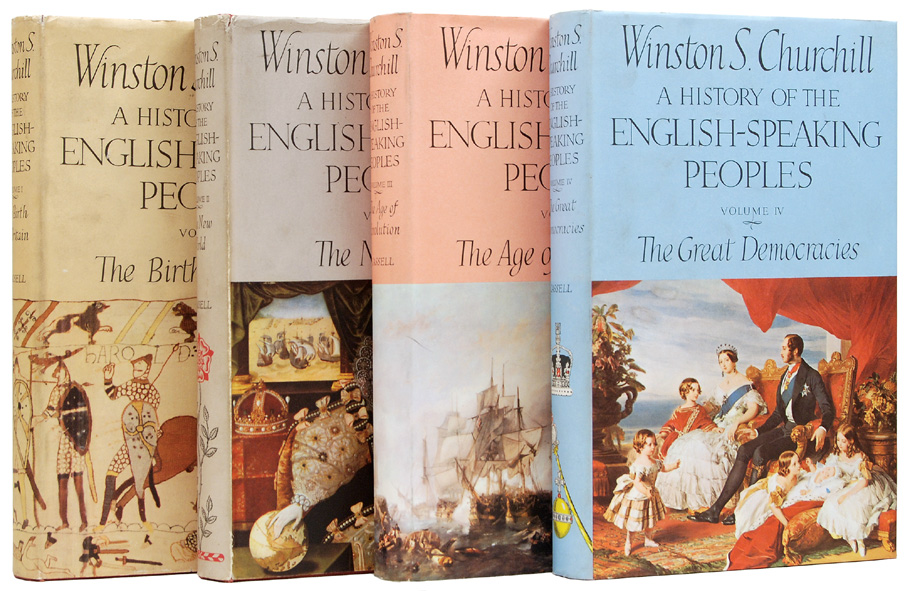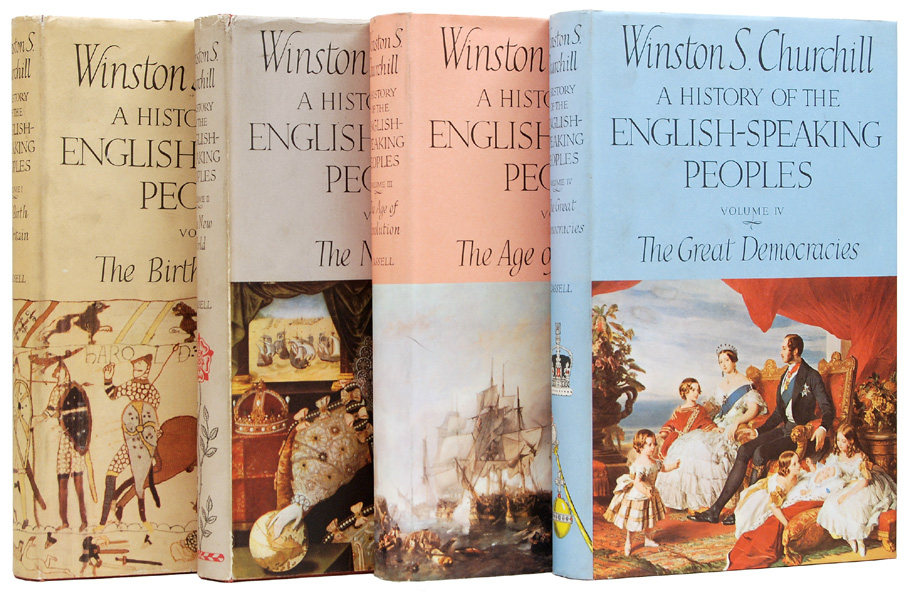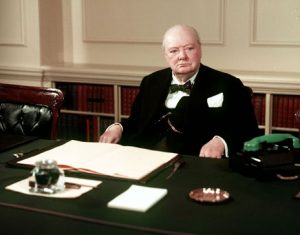
Bulletin #63 - Sep 2013
HESP Reconsidered

September 9, 2013
Churchill’s History of the English-Speaking Peoples Reveals Much
 Churchill’s last major work proved to be one of his best-selling. Published over the years 1956-58 when Churchill was at the height of his post-war fame, the four volumes had enormous print runs and first editions can still be easily found, although not so easily for sets in top condition. “The critical reception at the time,” Peter Clarke notes in his recent study of Churchill’s writing career, “was, in a word, uncritical.” The octogenarian author, however, was still shrewd enough to dismiss this as “pages of unending flattery.” Inevitably, revisionist assessments took a sterner view seeing the books as too Anglo-centric and leaving out the socio-economic dynamics so beloved of modern scholars. Yet Clement Attlee may have said more than he knew when he quipped the work should have been titled Things in History Which Interested Me. For to understand the importance of the History, the reader must focus precisely on what Churchill did include.
Churchill’s last major work proved to be one of his best-selling. Published over the years 1956-58 when Churchill was at the height of his post-war fame, the four volumes had enormous print runs and first editions can still be easily found, although not so easily for sets in top condition. “The critical reception at the time,” Peter Clarke notes in his recent study of Churchill’s writing career, “was, in a word, uncritical.” The octogenarian author, however, was still shrewd enough to dismiss this as “pages of unending flattery.” Inevitably, revisionist assessments took a sterner view seeing the books as too Anglo-centric and leaving out the socio-economic dynamics so beloved of modern scholars. Yet Clement Attlee may have said more than he knew when he quipped the work should have been titled Things in History Which Interested Me. For to understand the importance of the History, the reader must focus precisely on what Churchill did include.
Churchill completed drafts of the first three volumes just before the outbreak of the Second World War. The texts “slumbered” thereafter until 1956 by which time Churchill had retired as prime minister and had produced his war memoirs in six volumes. Resuming work on HESP, as the set is known for short, gave Churchill a last thrill of satisfying effort before his final decline. A crew of eminent, though largely unacknowledged, historians had a hand in the writing with Alan Hodge working behind the scenes as a discreet general editor. For all that, much of the first three volumes remained Churchill’s own version of events while the lengthy portion of the final volume covering the American Civil War also eminated from the Master.
Though the books have sold well, they seem now to be regarded, or even dismissed, as a romantic view of the past. Those who take the time to read the texts, however, instead of seeing them merely as shelf ornamentation will find this not at all to be the case. Discussing the 300 years of Roman occupation early in the first volume, Churchill makes the startling observation that in that era Britain “enjoyed probably the happiest, most comfortable, and most enlightened times its inhabitants have ever had.” After the Roman withdrawal, Britons required some 1500 years to re-attain on their own something like the same standard of living. Thus far from taking a hagiographic approach, Churchill has some harsh words about many of the “heroes” of British history.

2024 International Churchill Conference
Churchill was no Whig historian, and his was most certainly not a teleological approach. He states in the Preface that Parliament is a delicate plant: “There is nothing inevitable about its growth.” No specific conclusions are drawn from this, but those familiar with Churchill’s career can see where his view leads. Institutions dearly acquired and dearly paid for require constant nurturing. Each generation must attend to the task or reversals perhaps long and dark can and will occur. Individuals make a difference.
To obtain copies of A History of the English-Speaking Peoples please contact one of these fine dealers: The Churchill Book Collector at churchillbookcollector.com; Chartwell Booksellers at churchillbooks.com or The Churchill Book Specialist at wscbooks.com
Subscribe
WANT MORE?
Get the Churchill Bulletin delivered to your inbox once a month.




